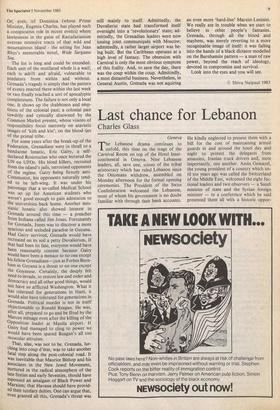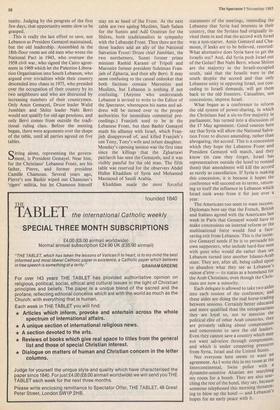Last chance for Lebanon
Charles Glass
Geneva
rr he Lebanese drama continues to unfold, this time on the stage of the Carnival Room on top of the Hotel Inter- continental in Geneva. Nine Lebanese leaders, all, save one, scions of the tribal aristocracy which has ruled Lebanon since the Ottomans withdrew, assembled on Monday afternoon for the formal opening ceremonies. The President of the Swiss Confederation welcomed the Lebanese, most of whom his government is no doubt familiar with through their bank accounts. He kindly neglected to present them with a bill for the cost of maintaining armed guards in and around the hotel day and night to protect the delegates from assassins, Iranian truck drivers and, most importantly, one another. Amin Gemayel, the young president of a country which un- til ten years ago was called the Switzerland of the Middle East, welcomed the eight fac- tional leaders and two observers — a Saudi minister of state and the Syrian foreign minister — to a conference which he said presented them all with a historic oppor- tunity. Judging by th'e progress of the first few days, that opportunity seems slow to be grasped.
This is really the last effort to save, not Lebanon as President Gemayel maintained, but the old leadership. Assembled in the 18th-floor room are old men who wrote the National Pact in 1943, who oversaw the 1958 civil war, who signed the Cairo agree- ment in 1969 which let the Palestine Libera- tion Organisation into South Lebanon, who argued over trivialities while their country descended into chaos in 1975, who presided over the occupation of their country by its two neighbours and who are distrusted by increasing numbers of their countrymen. Only Amin Gemayel, Druze leader Walid Jumblatt and Shiite leader Nabi Berri would not qualify for old-age pensions, and only Berri comes from outside the tradi- tional ruling class. Before the meeting began, there were arguments over the shape of the table, until all parties agreed on five tables.
Sitting alone, representing the govern- ment, is President Gemayel. Near him, for the Christians' Lebanese Front, are his father, Pierre, and former president Camille Chamoun. Several years ago, Pierre's son Bashir wiped out Chamoun's `tigers' militia, but let Chamoun himself stay on as head of the Front. At the next table are two ageing Muslims, Saeb Salam for the Sunnis and Adil Osseiran for the Shiites, both traditionalists in sympathy with the Lebanese Front. Then there are the three leaders and an ally of the National Salvation Front: Druze chief Jumblatt, the two northerners, Sunni former prime minister Rashid Karami of Tripoli and Maronite former president Suleiman Fran- jieh of Zgharta, and their ally Berri. It may seem confusing to the casual onlooker that both factions contain Maronites and Muslims, but Lebanon is nothing if not confusing. (Anyone who understands Lebanon is invited to write to the Editor of the Spectator, whereupon his name and ad- dress will be turned over to the proper authorities for immediate committal pro- ceedings.) Franjieh used to be in the Lebanese Front, but then Bashir Gemayel made his alliance with Israel, which Fran- jieh disapproved of, and killed Franjieh's son Tony, Tony's wife and infant daughter. Monday's opening session was the first time since the killings that the Zghartawi patriarch has seen the Gemayels, and it was visibly painful for the old man. The fifth table was reserved for the observers Abdel Halim Khaddam of Syria and Mohamed Massaoud of Saudi Arabia.
Khaddam made the most forceful statements of the meetings, reminding the Lebanese that Syria had interests in their country, that the Syrians had originally in- vited them in and that the accord with Israel was a non-starter. Amin Gemayel and Cha- moun, if leaks are to be believed, retorted: What alternative does Syria have to get the Israelis out? And, did Syria push Israel out of the Golan? But Nabi Berri, whose Shiites are the majority in the Israeli-occupied south, said that the Israelis were in the south despite the accord and that only Lebanese unity in opposing Israel, not con- ceding to Israeli demands, will get them back to the old frontiers. Casualties, not concessions, impress Israel.
What began as a conference to reform the old system of power-sharing, in which the Christians had a six-to-five majority in parliament, has turned into a discussion of the 17 May agreement. Good sources here say that Syria will allow the National Salva- tion Front to discuss amending, rather than abrogating, the accord. This is a concession which they hope the Lebanese Front and President Gemayel will match, and they know (in case they forget, Israel has representatives outside the hotel to remind them) that amendment will kill the accord as surely as cancellation. If Syria is making this concession, it is because it hopes the conference will succeed on its terms, return- ing to itself the influence in Lebanon which Israel took away from it for just over a year.
The Americans too seem to want success. Diplomats here say that the French, British and Italians agreed with the Americans last week in Paris that Gemayel would have to make concessions on internal reform or the multinational force would find a face- saving exit from Lebanon. This is the incen- tive Gemayel needs if he is to persuade his own supporters, who include hard-line men with guns who would die rather than see Lebanon turned into another Islamo-Arab state. They are, after all, being called upon to abandon what they see as Lebanon's raison d'etre — its status as a homeland for the Arab Christians, even though the Chris- tians are now a minority. Each delegate is allowed to take two aides into each session of the conference, and these aides are doing the real horse-trading between sessions. Certainly better educated and more qualified than the octogenarians they are loyal to, not to mention the political elite of other Arab countries, they are privately talking about compromises and concessions to save the old leaders. Even they cannot save a country which may not want salvation through compromise, and which is under competing pressures from Syria, Israel and the United States.
Not everyone here seems to want an agreement. As I write this in my room at the Intercontinental, Swiss police witha dynamite-sensitive Alsatian are searching my room for a bomb. They are also sear- ching the rest of the hotel, they say, because
someone telephoned this morning threaten- ing to blow up the hotel — and Lebanon s hopes for an early peace with it.















































 Previous page
Previous page